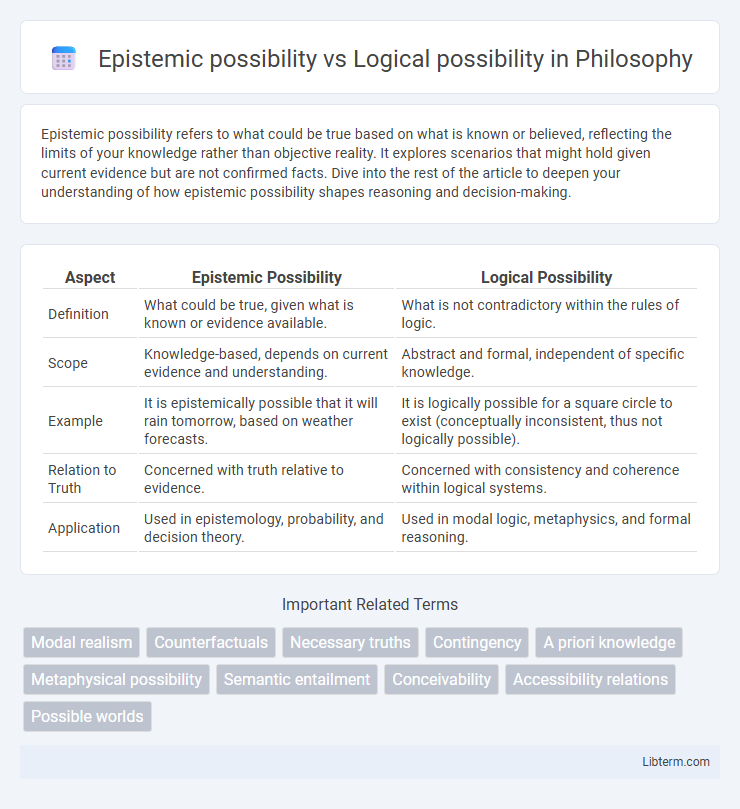Epistemic possibility refers to what could be true based on what is known or believed, reflecting the limits of your knowledge rather than objective reality. It explores scenarios that might hold given current evidence but are not confirmed facts. Dive into the rest of the article to deepen your understanding of how epistemic possibility shapes reasoning and decision-making.
Table of Comparison
| Aspect | Epistemic Possibility | Logical Possibility |
|---|---|---|
| Definition | What could be true, given what is known or evidence available. | What is not contradictory within the rules of logic. |
| Scope | Knowledge-based, depends on current evidence and understanding. | Abstract and formal, independent of specific knowledge. |
| Example | It is epistemically possible that it will rain tomorrow, based on weather forecasts. | It is logically possible for a square circle to exist (conceptually inconsistent, thus not logically possible). |
| Relation to Truth | Concerned with truth relative to evidence. | Concerned with consistency and coherence within logical systems. |
| Application | Used in epistemology, probability, and decision theory. | Used in modal logic, metaphysics, and formal reasoning. |
Understanding Epistemic Possibility
Epistemic possibility refers to what could be true given the information an agent currently possesses, focusing on knowledge limitations and uncertainty. It contrasts with logical possibility, which concerns what can exist without contradiction in any logically coherent world. Understanding epistemic possibility helps in evaluating scenarios based on what is knowable or plausible rather than strictly what is logically conceivable.
What is Logical Possibility?
Logical possibility refers to the coherence of a proposition within the rules of formal logic, meaning it can be conceived without contradiction. A scenario is logically possible if it does not violate any logical principles, regardless of actual or physical constraints. This contrasts with epistemic possibility, which pertains to what is known or unknown by an individual, focusing on knowledge and belief rather than formal logical consistency.
Key Differences: Epistemic vs Logical Possibility
Epistemic possibility pertains to what could be true based on current knowledge or evidence, reflecting uncertainty about the actual state of affairs. Logical possibility concerns what does not entail a contradiction within a given logical system, regardless of empirical evidence or knowledge. The key difference lies in epistemic possibility being tied to knowledge limitations, while logical possibility is grounded in formal consistency and the absence of contradiction.
Examples of Epistemic Possibility
Epistemic possibility refers to what could be true given what is currently known, such as "It might rain tomorrow" based on weather forecasts, despite uncertainty. Another example is "The suspect could have left the city," reflecting incomplete knowledge of their whereabouts. These examples contrast with logical possibility, which concerns what is logically coherent regardless of evidence or knowledge.
Illustrations of Logical Possibility
Logical possibility encompasses scenarios that are internally consistent within formal systems, such as imagining a square circle or a number greater than five that is both even and prime, which defy established logical definitions. Illustrations of logical possibility include mathematical constructs like non-Euclidean geometries or logically coherent worlds where physical laws differ from our own, demonstrating frameworks unbound by empirical constraints. These examples highlight the distinction from epistemic possibility, which depends on what is knowable or justified, rather than what can exist without contradiction.
The Role of Knowledge and Ignorance
Epistemic possibility hinges on an individual's knowledge or ignorance, determining what could be true given their current information, while logical possibility concerns what does not violate formal logic regardless of what is known. Knowledge restricts epistemic possibility by eliminating scenarios that contradict established facts, whereas ignorance expands it by allowing more hypothetical outcomes. Understanding this distinction clarifies how belief systems influence reasoning and decision-making processes under uncertainty.
Modal Logic and Possibility
Epistemic possibility concerns what could be true given what is known, reflecting uncertainty and knowledge limitations within modal logic frameworks. Logical possibility denotes what is consistent with the rules of logic, encompassing all conceivable scenarios without contradiction. Modal logic distinguishes these modalities by using operators to capture necessity and possibility, enabling formal analysis of epistemic states versus purely logical constraints.
Philosophical Implications and Debates
Epistemic possibility concerns what could be true given what is known, reflecting limitations in knowledge or evidence, whereas logical possibility pertains to what is conceivable without contradiction, irrespective of actual facts. Philosophical debates often explore how epistemic possibility relates to uncertainty and skepticism, challenging the scope of human knowledge and the justification of beliefs. Discussions also probe the implications of equating or distinguishing these possibilities for modal logic, metaphysics, and theories of truth.
Common Misconceptions Explained
Epistemic possibility concerns what could be true based on what is known, while logical possibility pertains to what is conceivable without contradiction. A common misconception is that logical possibility always aligns with epistemic possibility, yet scenarios logically possible may remain epistemically impossible due to limited knowledge or evidence. Clarifying this distinction prevents confusion in modal reasoning and philosophical discussions about knowledge and belief.
Conclusion: Why Distinguishing Possibility Matters
Distinguishing epistemic possibility from logical possibility is crucial for accurate reasoning and decision-making because epistemic possibility relates to what is known or believeable given current evidence, while logical possibility concerns what can exist without contradiction in any conceivable scenario. Misunderstanding this distinction can lead to conflating uncertainty with logical consistency, affecting fields like philosophy, artificial intelligence, and risk assessment. Recognizing the difference ensures clear communication about what scenarios are genuinely conceivable versus those that are simply unknown or unverified.
Epistemic possibility Infographic

 libterm.com
libterm.com